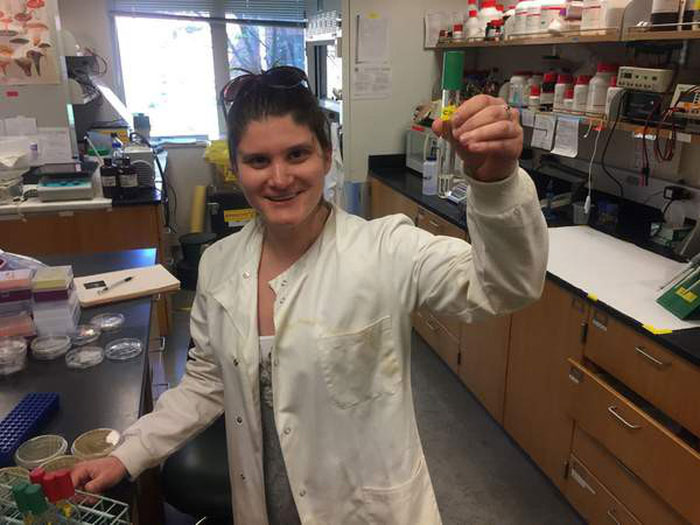Female students find bacteria that eat plastic
A new discovery by an American female student about plastic-eating bacteria reveals the possibility of finding a possible solution to the global plastic garbage crisis.
According to the Independent newspaper, the bacterium is capable of decomposing polyethylene terephthalate (PET) , one of the most popular plastics in the world, which is used in clothing, plastic bottles of water and other types of packaging. Products.
Typically, in theory, these plastic waste will take several centuries to decompose. In the process, it also causes a lot of harms that cannot be fully estimated with the surrounding environment.
According to female student Morgan Vague , who is currently studying biology at Reed State College of Oregon, if this decomposition process is accelerated, it will play a very important part in solutions to solve the problem of plastic waste of onions. fine.
Every year, about 300 million tons of plastic waste is being dumped into landfills and oceans around the world. Only about 10% of them are recycled.

Morgan Vague - (Photo: REED COLLEGE).
"When I started learning about plastic garbage statistics, I understood that we are facing a very serious problem and need to have some way to solve it," shared Vague.
After learning about bacterial metabolism and "all the crazy things that bacteria can do," the female student decided to find out if the bacteria could decompose immediately. Plastic waste not.
She began searching for bacteria that were adapted to metabolic mechanisms to break down plastic in soil and water around factory areas in Houston, her hometown.
Bringing these bacteria back to the school in Portland, Oregon, Vague began testing about 300 strains of bacteria about the amount of lipase-degrading enzymes, thereby exploring the ability of bacteria to break down the bacteria.
Vague then identified 20 strains of bacteria capable of producing lipase and three of them had very high levels of lipase. She then placed all three of them, one of which seemed to be the type that had never been discovered before, into a mandatory "plastic" PET diet , these were Vague plastic pieces cut from plastic bottles.
To Vague's astonishment, this strain of bacteria has been able to digest the plastic, creating products that no longer harm the environment.
However, this female student warned "there is still a long way to go" until it is possible to find the plastic-eating bacteria that achieve the desired speed to be able to fly the volume of plastic waste currently .
Professor John McGeehan, a biologist at Plymouth University, has conducted research on plastic-degrading enzymes, showing caution when evaluating Vague's research achievements.
Although he thinks this is one of the interesting findings, he thinks that it is only in the early stages and needs more experiments to confirm.
- Discover a new type of bacteria
- The revolution is expected by the world: Plastics can be recycled into CO2 and water
- Detection of bacteria capable of biodegradable plastic
- In elementary school, female students feel happier than male students
- This new finding may soon cause plastic waste in the ocean to disappear quickly
- Find creatures that help destroy plastic waste fastest
- Scientists find the world's first reusable plastic
- Smart application that helps new students find safe accommodation
- The habit of re-using plastic everyone does but brings unexpected harm
- Evolutionary bacteria can eat plastic to contaminate the ocean
- Bacteria turn foam into plastic self-destruct
- The danger of 'death' stalks from using plastic cutting boards
 Why do potatoes have eyes?
Why do potatoes have eyes? 'Tragedy' the world's largest carnivorous life: Death becomes ... public toilet
'Tragedy' the world's largest carnivorous life: Death becomes ... public toilet Tomatoes were once considered 'poisonous' for 200 years
Tomatoes were once considered 'poisonous' for 200 years Detecting microscopic parasites on human face
Detecting microscopic parasites on human face